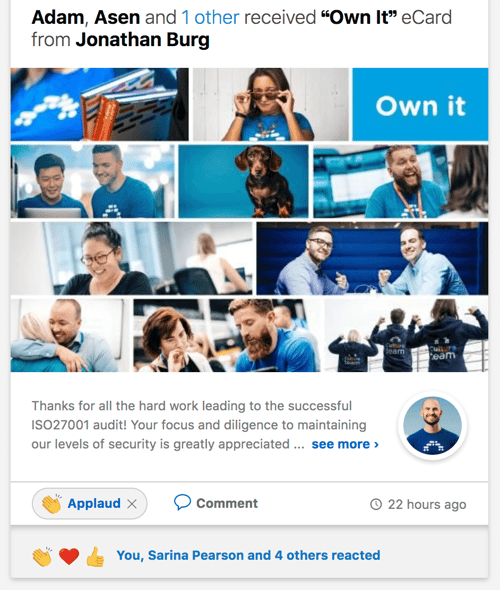If you work at a larger organisation or one in which communication is challenging, you may be faced with silos that can harm attempts to improve employee engagement. Silos can form for a number of different reasons, including poor communication, disconnect from the top down, misunderstanding of the organisation’s purpose, mission and values or lack of recognition from their colleagues.
When this happens, people tend to retreat to the safety of their inner circle rather than going to the wider business and may pursue goals and objectives that don’t align with the company. Silos harm organisations in a number of different ways:
| 1. They're less productive. |
| 2. There's less teamwork. |
| 3. There's less communication. |
| 4. They're unfocussed. |
| 5. They waste energy defending their roles. |
| 6. They make decisions that favour themselves over the company. |
Fortunately, silos can be broken down, and it requires everyone at the company, from management to the people working in silos, to participate. HR’s role is to help facilitate the breakdown, so the company can move forward. Together.
The biggest challenge in overcoming silos is making everyone feel comfortable about working in a team-oriented environment.
Some people may experience anxiety working in a team, while others may fear losing their job if their role becomes a team effort. You can address these challenges — and increase overall employee engagement — by cultivating a workplace that values collaboration. Here are five great ways to do that:

1. Make collaboration part of your core values
Your core values define your corporate culture and set the tone for how employees engage with the organisation and interact with each other. At Reward Gateway, one of our values is to Think Global, which defines the collaborative workforce we have here.
RG People understand they are part of something bigger, that our strength comes from being united. They understand that our success demands more than individual excellence in personal roles.
It requires working together across departmental, geographical and cultural boundaries, to achieve something greater than what they can achieve alone.
2. Set an example from management
If you have a silo-based leadership team, you’re going to have an organisation that’s oriented toward silo-based working. So you need to set an example from the top. It’s one of the reasons why Reward Gateway moved to a functional leadership team.
We want to have everybody working together toward the same goals, with the focus on getting things done rather than on who is in charge. So even though I work in HR, I get involved in everything that the rest of the team does, and this helps create balance among our leadership team as a result.
3. Make communications more personable
One of the biggest ways to break down silos and engage more individuals in the broader goals of the organisation, as more and more employees return to the office, is to simply get up out of your seat and talk to people. Explain things to them in person (or virtually, with a quick coffee chat, if you're still working remotely). They’ll be much more open to what you’re trying to accomplish than if you’re only sending impersonal emails.
I spend a lot of my time talking to people and listening to their issues or concerns. When we have new initiatives coming out, I share that information right away with people I talk to so that they have an opportunity to address their concerns before the big announcement. Here at Reward Gateway, we use our employee communications tool to share new initiatives and make sure people are aware of them so that there are fewer issues.
I suggest creating a communications path — opt to talk in person or calling instead of messaging or emailing. Open communication is key.
4. Share each other’s perspectives
There’s an old saying that goes, “You can’t understand someone until you’ve walked a mile in their shoes.” I think you can apply that to the workplace to create a more collaborative environment. Get people on different teams to walk in each other’s shoes. Have them swap roles for a day or shadow one another on customer calls.
That kind of listening together and getting another person’s perspective will enable workers to bond and share information they may not have otherwise. They’ll be less likely to form silos once they’ve gained a new level of understanding.
Breaking down silos is just one of the upsides to increasing your company’s overall employee engagement.
5. Focus on cross-departmental recognition
Connecting dispersed teams with cross-departmental recognition is an easy – and often ignored – way to break down company silos. When organisations utilise an employee recognition programme, employees are able to show appreciation for others in the business by sending peer-to-peer recognition to any colleague, across any location or department.
If there’s a team in your organisation that typically isn’t in the spotlight as much as others, you can use recognition to bring their projects and initiatives to the forefront and notify others in the business.
These recognition moments live on a social recognition wall that amplifies the recognition and makes it public to the entire company. On the social wall, employees can use filters to see who’s been recognised, what department they’re in and what value they demonstrated.

Then colleagues can add reactions, such as 'like,' 'love' or 'applaud,' and add comments to make the recognition more visible. What’s more, managers receive alerts whenever their direct reports get recognised, helping to create a culture of continuous recognition.
My colleagues and I can show you even more ways to engage your employees, improve communications and foster a collaborative work environment. Get in touch below if you’re interested in learning more.

 Robert Hicks
Robert Hicks



